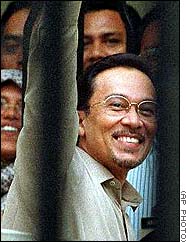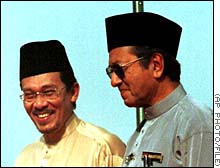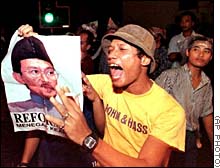
 |
|
| Anwar | |
KUALA LUMPUR, Malaysia (Reuters) -- The judge presiding over the criminal trial of Anwar Ibrahim dealt a setback to the sacked finance minister on Monday when he denied observer status to international observers and the local bar council.
"It's tough going in the first part of the trial, but what can we do?" Anwar said during a break on the first day of his trial on corruption and sodomy charges in the Malaysian capital's High Court.
Several hundred police with automatic rifles, shields and batons ringed the courthouse in the heart of the capital as the trial got under way, two months to the day after Prime Minister Mahathir Mohamad dismissed Anwar.
About 500 people gathered around the courthouse behind police lines.
Leaders said they had decided to stage a silent protest and not provoke
a crackdown by riot police by shouting anti-government slogans.
 |
|
| Anwar, left, and Prime Minister Mahathir during a 1998 June meeting | |
"We will continue until we have good government, until Mahathir steps down," one of the protesters said.
Anwar repeated his not guilty plea to four of the five corruption charges during the morning proceedings. He has denied all 10 charges of corruption and sodomy levelled against him.
During the two-and-a-half-hour morning session, Judge Augustine Paul rejected a request by Anwar's lawyers that the Malaysian Bar Council, several rights groups and U.N. Rapporteur Param Cumaraswamy be granted observer status.
"This is a big insult to the court," Augustine said of the request. "It gives the impression that the court may not be dispensing justice."
The groups included Amnesty International, Justice International, Law
Asia, Human Rights Watch and Jakarta Legal Aid Bureau. They have all expressed
concern over Anwar's arrest, treatment in detention and legal prospects.
 |
|
| A supporter holds a picture of Anwar as he shouts anti-government slogans during a Saturday protest | |
The debate over international observers symbolized the divisions that Anwar's sacking exposed in Malaysian politics.
Anwar's arrest on September 20 and apparent beating while in police custody raised a storm of protest in capitals across the globe, where Anwar had established a reputation as a market-savvy moderate able to lead Malaysia into the next century.
But Anwar's critics have long accused him of currying favor among the international community, and he has said he expects eventually to be charged with treason. Mahathir has spoken out against international groups being granted observer status.
Before his trial began, Anwar hugged his wife, Wan Azizah Wan Ismail, his two eldest daughters and father and mother.
"I'm all right," Anwar told reporters. He no longer had the black eye which stunned the world in September, and he was not wearing the neck brace he had previously worn.
Anwar's lawyers raised an early objection, arguing that Anwar had been improperly charged under an ordinance they said parliament would soon annul.
Lawyers mixed Bahasa Malaysia and English, striking an inadvertent compromise between Anwar's team, which had supported Augustine's ruling that the trial would be conducted in English, and the prosecution, which opposed the ruling.
After Augustine made his controversial language ruling last month, the chief justice said by law the trial would have to be in native Malay. But lawyers said both languages could be used.
Anwar's sacking and arrest have thrown a rare spotlight on Malaysia, which has been ruled since 1981 by Mahathir.
Anwar was dismissed as deputy prime minister and finance minister on September 2 and arrested 18 days later after leading 30,000 anti-government protesters through the streets of the capital and Merdeka Square.
Malaysia does not have a jury system and the allegations will be heard by the single judge, Augustine.
Initially, the court will hear four of the five corruption charges. Each of the corruption counts carries a maximum penalty of 14 years in jail and a 20,000 ringgit ($5,000) fine.
Each of the five sodomy charges carries a maximum penalty of 20 years in jail and whipping.
The trial's outcome can be appealed to the Court of Appeal.
Copyright 1998 Reuters
Limited. All rights reserved.